 The Glass Box, by J. Michael Straczynski
The Glass Box, by J. Michael Straczynski
Riley Diaz was born to fight back. When she’s incarcerated under the authority of a shadowy new defense act, Riley is sent to one of a growing number of American Renewal Centers (ARCs)–institutions modeled after psychiatric facilities–for mandatory reeducation. Forced therapy, involuntary medication, solitary confinement, restricted rations, and more are all in the ARC program’s bag of dirty tricks designed to break down dissidents. Give in, and you go free. Resist, and … Riley declares a one-woman war against the gaslighting and manipulation in a struggle to take down the ARC program and its white-coated collaborators. Despite being isolated and resented by her fellow inmates, Riley eventually wins their trust, and forms a heartfelt, life-and-death bond with a mysterious patient known only as Frankenstein, who is as enigmatic as his namesake. Sometimes breaking an unjust system starts with one person willing to stand up–when standing is the hardest thing in the world–and saying “no.” Riley Diaz is willing to stand behind that word, regardless of the cost, in order to put her fist through the Glass Box once and for all.
 All the Rage (DI Adam Fawley #4), by Cara Hunter
All the Rage (DI Adam Fawley #4), by Cara Hunter
After being abducted and assaulted, a teenage girl somehow managed to escape from her captor. She is traumatized and needs to heal, but the police need her help to catch her assailant—information she clearly knows, but is unwilling to give. Without the girl’s assistance, DI Adam Fawley’s investigation is at a dead end. When another girl vanishes under the same circumstances, he recognizes a disturbing pattern—and a link to something long buried in his past. . .
 The Uncharted Flight of Olivia West, by Sara Ackerman
The Uncharted Flight of Olivia West, by Sara Ackerman
An extraordinary story, inspired by real events, of a female aviator who defies the odds to embark on a daring air race across the Pacific.
1927. Olivia “Livy” West is a fearless young pilot with a love of adventure. She yearns to cross oceans and travel the skies. When she learns of the Dole Air Race––a high-stakes contest to be the first to make the 2,400 mile Pacific crossing from the West Coast to Hawai’i—she sets her sights on qualifying. But it soon becomes clear that only men will make the cut. In a last-ditch effort to take part, Livy manages to be picked as a navigator for one of the pilots, before setting out on a harrowing journey that some will not survive.
1987. Wren Summers is down to her last dime when she learns she has inherited a remote piece of land on the Big Island with nothing on it but a dilapidated barn and an overgrown mac nut grove. She plans on selling it and using the money to live on, but she is drawn in by the mysterious objects kept in the barn by her late great-uncle––clues to a tragic piece of aviation history lost to time. Determined to find out what really happened all those years ago, Wren enlists the help of residents at a nearby retirement home to uncover Olivia’s story piece by piece. What she discovers is more earth-shattering, and closer to home, than she could have ever imagined.
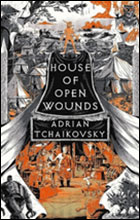 House of Open Wounds (The Tyrant Philosophers #2), by Adrian Tchaikovsky
House of Open Wounds (The Tyrant Philosophers #2), by Adrian Tchaikovsky
City-by-city, kingdom-by-kingdom, the Palleseen have sworn to bring Perfection and Correctness to an imperfect world. As their legions scour the world of superstition with the bright flame of reason, so they deliver a mountain of ragged, holed and scorched flesh to the field hospital tents just behind the frontline.
Which is where Yasnic, one-time priest, healer and rebel, finds himself. Reprieved from the gallows and sent to war clutching a box of orphan Gods, he has been sequestered to a particularity unorthodox medical unit.
Led by ‘the Butcher’, an ogre of a man who’s a dab hand with a bone-saw and an alchemical tincture, the unit’s motley crew of conscripts, healers and orderlies are no strangers to the horrors of war. Theirs is an unspeakable trade: elbow-deep in gore they have a first-hand view of the suffering caused by flesh-rending monsters, arcane magical weaponry and embittered enemy soldiers.
Entrusted – for now – with saving lives deemed otherwise un-savable, the field hospital’s crew face a precarious existence. Their work with unapproved magic, necromancy, demonology and Yansic’s thoroughly illicit Gods could lead to the unit being disbanded, arrested or worse.
Beset by enemies within and without, the last thing anyone needs is a miracle.
 All Our Yesterdays: A Novel of Lady Macbeth, by Joel H. Morris
All Our Yesterdays: A Novel of Lady Macbeth, by Joel H. Morris
Scotland, 11th Century. Born into a noble household and granddaughter of a forgotten Scottish king, a young girl carries the guilt of her mother’s death and the weight of an unknowable prophecy. When she is married at fifteen to the Mormaer of Moray, she experiences the violence of a sadistic husband and a kingdom constantly at war. To survive with her young son in a superstitious realm, she must rely on her own cunning and wit, especially when her husband’s downfall inadvertently sets them free.
Suspicious of the dark devices that may have led to his father’s death, her son watches as his mother falls in love with the enigmatic thane Macbeth. Now a woman of stature, Lady Macbeth confronts a world of masculine power and secures the protection of her family. But the coronation of King Duncan and the political maneuvering of her cousin Macduff set her on a tragic course, one where her own success might mean embracing the very curse that haunts her and risking the child she loves.
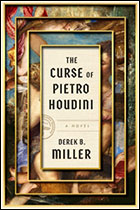 The Curse of Pietro Houdini, by Derek B. Miller
The Curse of Pietro Houdini, by Derek B. Miller
August, 1943. Fourteen-year-old Massimo is all alone. Newly orphaned and fleeing from Rome after surviving the American bombing raid that killed his parents, Massimo is attacked by thugs and finds himself bloodied at the base of the Montecassino. It is there in the Benedictine abbey’s shadow that a charismatic and cryptic man calling himself Pietro Houdini, the self-proclaimed “Master Artist and confidante of the Vatican,” rescues Massimo and brings him up the mountain to serve as his assistant in preserving the treasures that lay within the monastery walls.
But can Massimo believe what Pietro is saying, particularly when Massimo has secrets too? Who is this extraordinary man? When it becomes evident that Montecassino will soon become the front line in the war, Pietro Houdini and Massimo execute a plan to smuggle three priceless Titian paintings to safety down the mountain. They are joined by a nurse concealing a nefarious past, a café owner turned murderer, a wounded but chipper German soldier, and a pair of lovers along with their injured mule, Ferrari. Together they will lie, cheat, steal, fight, kill, and sin their way through battlefields to survive, all while smuggling the Renaissance masterpieces and the bag full of ancient Greek gold they have rescued from the “safe keeping” of the Germans.
 Medea, by Eilish Quin
Medea, by Eilish Quin
Discover the full story of the sorceress Medea, one of the most reviled and maligned women of Greek antiquity, in this propulsive and evocative debut in the tradition of Circe, Elektra, and Stone Blind.
Among the women of Greek mythology, the witch Medea may be the most despised. Known for the brutal act of killing her own children to exact vengeance on her deceitful husband, the Argonauts leader Jason, Medea has carved out a singularly infamous niche in our histories.
But what if that isn’t the full story?
The daughter of a sea nymph and the granddaughter of a Titan, Medea is a paradox. She is at once rendered compelling by virtue of the divinity that flows through her bloodline and made powerless by the fact of her being a woman. As a child, she intuitively submerges herself in witchcraft and sorcery, but soon finds it may not be a match for the prophecies that hang over her entire family like a shroud.
As Medea comes into her own as a woman and a witch, she also faces the arrival of the hero Jason, preordained by the gods to be not only her husband, but also her lifeline to escape her isolated existence. Medea travels the treacherous seas with the Argonauts, battles demons she had never conceived of, and falls in love with the man who may ultimately be her downfall.
 The Innocents, by Bridget Walsh
The Innocents, by Bridget Walsh
The hotly anticipated follow-up to The Tumbling Girl , The Innocents follows Minnie and Albert on a new crime-solving quest in the world of a Victorian music hall. A string of murders has torn through London, throwing together the now notorious Minnie Ward and Albert Easterbrook once again. It seems that the crimes all link back to a tragedy fourteen years ago that left 183 children dead. But given that the incident touched so many people’s lives, everyone is a suspect . . .
 How We Named the Stars, by Andrés N. Ordorica
How We Named the Stars, by Andrés N. Ordorica
When Daniel de La Luna arrives as a scholarship student at an elite East Coast university, he bears the weight of his family’s hopes and dreams, and the burden of sharing his late uncle’s name. Daniel flounders at first―but then Sam, his roommate, changes everything. As their relationship evolves from brotherly banter to something more intimate, Daniel soon finds himself in love with a man who helps him see himself in a new light. But just as their relationship takes flight, Daniel is pulled away, first by Sam’s hesitation and then by a brutal turn of events that changes Daniel’s life forever. As he grapples with profound loss, Daniel finds himself in his family’s ancestral homeland in México for the summer, finding joy in this setting even as he struggles to come to terms with what’s happened. How is his own story connected to his late uncle’s? And how might he reconcile the many parts of himself as he learns to move forward? Equal parts tender and triumphant, Andrés N. Ordorica’s How We Named the Stars is a debut novel of love, heartache, redemption, and learning to honor the dead; a story of finding the strength to figure out who you are―and who you could be―if only the world would let you.
 Your Absence is Darkness, by Jón Kalman Stefánsson
Your Absence is Darkness, by Jón Kalman Stefánsson
A man comes to awareness in a church in rural Iceland, not knowing why he’s there or how he arrived. When a local woman offers to reunite him with her sister, he realizes he’s lost not only his bearings, but his memory as he doesn’t recall either sister, or their mother, the woman buried beneath the stone. As their stories unfold, he’s plunged into a history spanning centuries and a city girl drawn to the fjords by the memory of a blue-eyed gaze; a pastor who writes to dead poets and falls in love with a stranger from afar; a woman who must abandon her son to save her family; a musician plagued by cosmic loneliness; and an alcoholic transfixed by the night sky. Faced with the violence of destiny and the effects of choices, made and avoided, that cascade between lives, each discovers the cost of happiness and must answer the difficult question of how to love and be loved.
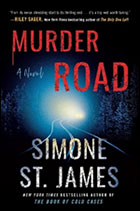 Murder Road, by Simone St. James
Murder Road, by Simone St. James
July 1995. April and Eddie have taken a wrong turn. They’re looking for the small resort town where they plan to spend their honeymoon. When they spot what appears to be a lone hitchhiker along the deserted road, they stop to help. But not long after the hitchhiker gets into their car, they see the blood seeping from her jacket and a truck barreling down Atticus Line after them.
When the hitchhiker dies at the local hospital, April and Eddie find themselves in the crosshairs of the Coldlake Falls police. Unexplained murders have been happening along Atticus Line for years and the cops finally have two witnesses who easily become their only suspects. As April and Eddie start to dig into the history of the town and that horrible stretch of road to clear their names, they soon learn that there is something supernatural at work, something that could not only tear the town and its dark secrets apart, but take April and Eddie down with it all.
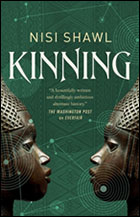 Kinning (Everfair #2), by Nisi Shawl
Kinning (Everfair #2), by Nisi Shawl
The Great War is over. Everfair has found peace within its borders. But our heroes’ stories are far from over.
Tink and his sister Bee-Lung are traveling the world via aircanoe, spreading the spores of a mysterious empathy-generating fungus. Through these spores, they seek to build bonds between people and help spread revolutionary sentiments of socialism and equality—the very ideals that led to Everfair’s founding.
Meanwhile, Everfair’s Princess Mwadi and Prince Ilunga return home from a sojourn in Egypt to vie for their country’s rule following the abdication of their father King Mwenda. But their mother, Queen Josina, manipulates them both from behind the scenes, while also pitting Europe’s influenza-weakened political powers against one another as these countries fight to regain control of their rebellious colonies.
Will Everfair continue to serve as a symbol of hope, freedom, and equality to anticolonial movements around the world, or will it fall to forces inside and out?
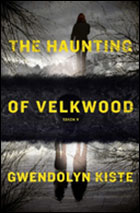 The Haunting of Velkwood, by Gwendolyn Kiste
The Haunting of Velkwood, by Gwendolyn Kiste
The Velkwood Vicinity was the topic of occult theorists, tabloid one-hour documentaries, and even some pseudo-scientific investigations as the block of homes disappeared behind a near-impenetrable veil that only three survivors could enter—and only one has in the past twenty years, until now.
Talitha Velkwood has avoided anything to do with the tragedy that took her mother and eight-year-old sister, drifting from one job to another, never settling anywhere or with anyone, feeling as trapped by her past as if she was still there in the small town she so desperately wanted to escape from. When a new researcher tracks her down and offers to pay her to come back to enter the vicinity, Talitha claims she’s just doing it for the money. Of all the crackpot theories over the years, no one has discovered what happened the night Talitha, her estranged, former best friend Brett, and Grace, escaped their homes twenty years ago. Will she finally get the answers she’s been looking for all these years, or is this just another dead end?
 The Disappearance of Astrid Bricard, by Natasha Lester
The Disappearance of Astrid Bricard, by Natasha Lester
French countryside, Present Blythe Bricard is the daughter of famous fashion muses but that doesn’t mean she wants to be one. She turned her back on that world, and her dreams, years ago. Fate, however, has a different plan, and Blythe will discover there is more to her iconic mother and grandmother than she ever knew. New York, 1970: Designer Astrid Bricard arrives in bohemian Chelsea determined to change the fashion world forever. And she does―cast as muse to her lover, Hawk Jones. And when they’re both invited to compete in the fashion event of the century―the Battle of Versailles―Astrid sacrifices everything to showcase her talent. But then, just as her career is about to take off, she mysteriously vanishes, leaving behind only a white silk dress.
Paris, 1917: Parentless sixteen-year-old Mizza Bricard has made a to be remembered on her own terms. Her promise sustains her through turbulent decades and volatile couture houses until, finally, her name is remembered and a legend is born―one that proves impossible for Astrid and Blythe to distance themselves from.
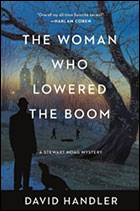 The Woman Who Lowered the Boom, by David Handler
The Woman Who Lowered the Boom, by David Handler
Stewart “Hoagy” Hoag is walking on cloud nine after a meeting with his editor, Norma Fives, where she predicts his new book is sure to establish him as the next great American author. It has been years since he has even dreamed of such success after a crippling case of writer’s block limited his literary aspirations to ghostwriting celebrity memoirs. But his happiness is short-lived when at his next meeting with Norma she asks for his help in discovering who is behind a series of increasingly threatening letters sent to her attention.
Norma herself is not overly concerned about the letters but her boyfriend, Detective Lieutenant Romaine Very of the NYPD, thinks the threat of violence against Norma should not be so easily dismissed. Very feels the combination of Hoagy’s detective skills and knowledge of the underbelly of the publishing world make him the perfect person to investigate the matter. Plus, Hoagy is a friend he can trust to take care of the love of his life. Hoagy agrees if for nothing else than to ease the minds of two people he cares about very much. After all, this is likely to be nothing more than a dramatic gesture from a frustrated writer.
But as Hoagy and Lulu investigate, the threats move beyond the written word, making it clear that someone out there is determined to write a vicious ending to Norma’s life. Could it be the wealthy aging children’s author? The unethical snake of a literary agent? Or the handsy historian? This is not the return to the literary world that Hoagy dreamed of, but he is determined to unravel the mystery before the author of these crimes gets the last word.
 The Painter’s Daughters, by Emily Howes
The Painter’s Daughters, by Emily Howes
Peggy and Molly Gainsborough—the daughters of one of England’s most famous portrait artists of the 1700s and the frequent subject of his work—are best friends. They spy on their father as he paints, rankle their mother as she manages the household, and run barefoot through the muddy fields that surround their home. But there is another reason they are from a young age, Molly periodically experiences bouts of mental confusion, even forgetting who she is, and Peggy instinctively knows she must help cover up her sister’s condition.
When the family moves to Bath, it’s not so easy to hide Molly’s slip-ups. There, the sisters are thrown into the whirlwind of polite society, where the codes of behavior are crystal clear. Molly dreams of a normal life but slides deeper and more publicly into her delusions. By now, Peggy knows the shadow of an asylum looms for women like Molly, and she goes to greater lengths to protect her sister’s secret.
But when Peggy unexpectedly falls in love with her father’s friend, the charming composer Johann Fischer, the sisters’ precarious situation is thrown catastrophically off course. Her burgeoning love for Johann sparks the bitterest of betrayals, forcing Peggy to question all she has done for Molly, and whether any one person can truly change the fate of another.
